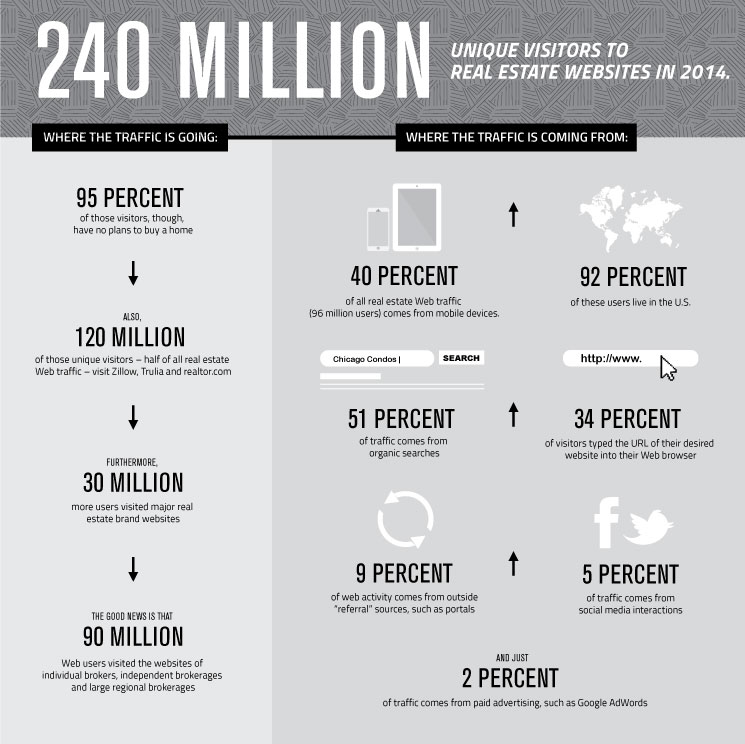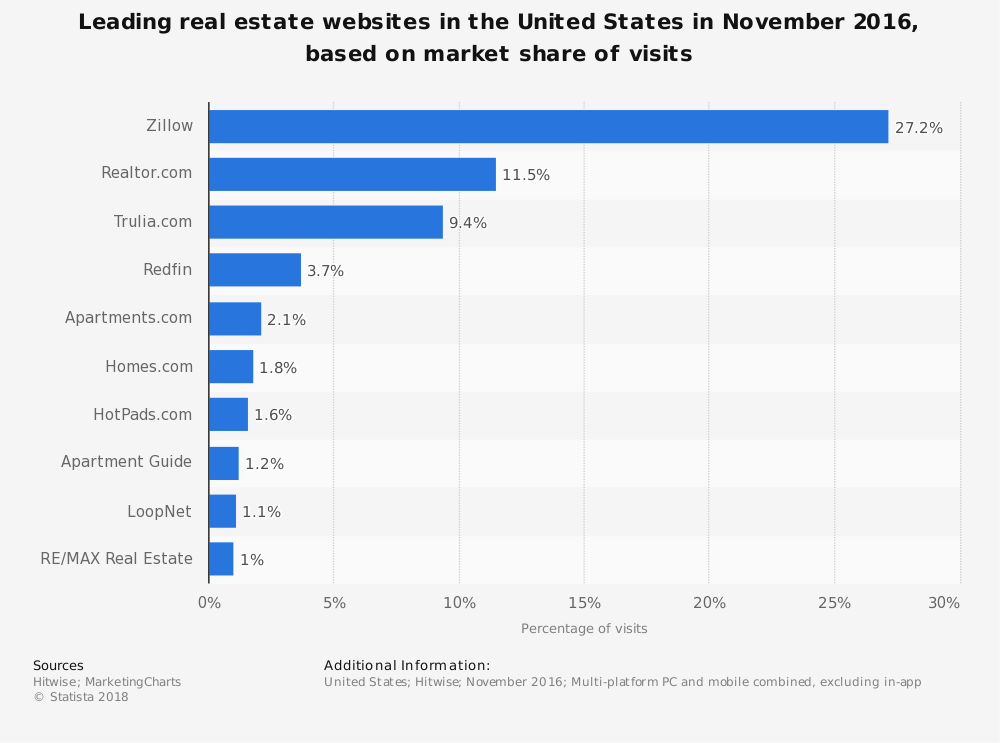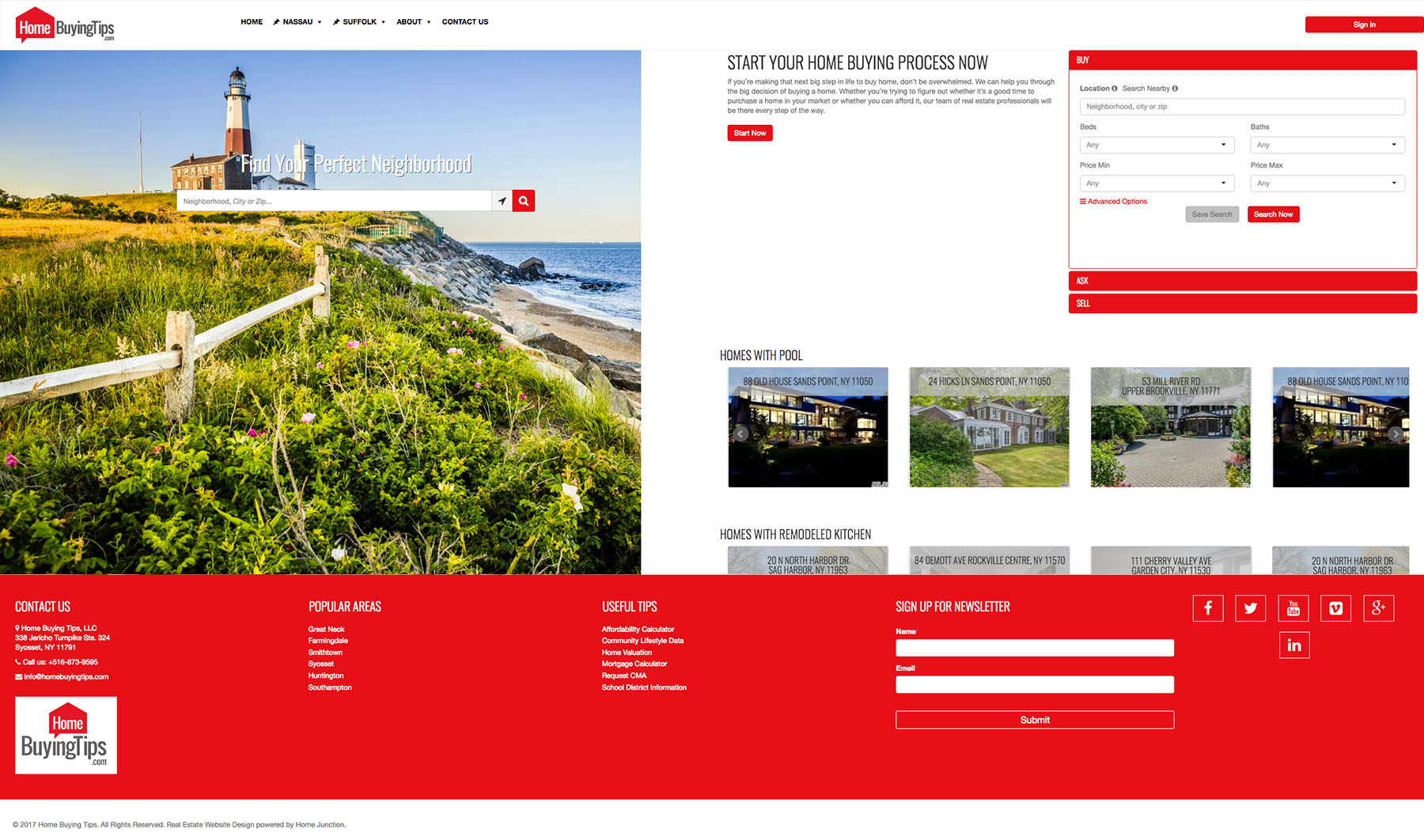Sure, digital home shoppers are increasingly turning to the major listing portals to find their dream home. The search for an agent, however, is very different. And it usually begins with your website.
When you start off your real estate career, one of your first acquisitions will be a real estate website. Most of your competitors will have a website. So how will yours stand out from the rest?
Choosing the right website CMS is only the first hurdle. Building your website into an online hub of local real estate information that attracts qualified buyers and sellers – yeah, that’s another story.
Planning and research can give you the edge you need in a competitive market. That’s why we’re going to share with you a comprehensive strategy for creating a killer real estate website.
Why You Need a Good Website
Active prospecting in your farm will provide you with a major source of leads. Most of your prospects, however, will discover you through word-of-mouth, NOT your listings!
Your website will likely serve as your first point of contact with prospective buyers and sellers. So, when a prospect decides to search for you online because of a referral, they will check out your website.
Prospects you meet through networking, cold-calling, or interviews will also refer to your website for more information about you.
If your website is convincing, you stand a very high chance of closing the listing appointment. On the other hand, if your website is absent or shoddy, you’ll drive prospects away.
A good real estate website has 5 critical functions:
- Branding (mission statement, core values)
- Social Proof (reviews, testimonials)
- Sales (calls-to-action, value-proposition, landing pages, lead magnets)
- Marketing (retargeting, chatbots)
- Services: listings, floor plans, MLS information, resources, apps
Keep this in mind when you begin planning the content, design, and functionality of your website.
Website Traffic: Where Will It Come From
While a lot of agents feel the need to invest in online advertising, only 2% of all real estate traffic is generated this way.

The results above are taken from a 2014 study, but the findings remain fundamentally relevant. Optimize your website for organic traffic, and the listings will come.
The vast majority of prospective buyers and sellers prefer the major listing portals like realtor.com, Placester, Trulia, and Zillow.

Why? The user experience and breadth of options make these sites easy for consumers. They don’t have to engage with an agent unless they want to, and can maintain anonymity until they are ready to make a decision.
The User Experience Comes First
Top real estate brands understand that UX, or user experience, isn’t just a tech buzzword. Digital home shoppers flock to sites like Zillow, Trulia, and Realtor.com because they offer a hassle-free experience. In other, words, they are expressly designed to make the user’s home search easier.
Rather than thinking exclusively of how your website can showcase your expertise, consider how users will interact with your website. Prioritize the user, not yourself.
Give online visitors a pleasurable experience and they will return.

Here are some general UX tips to make your website more user-friendly for prospective buyers and sellers:
UX Tips For Your Real Estate Website
- Create an attractive home page. Add a new feature image weekly or a feature video. Just keep it fresh, bright and inviting.
- Include unique, optimized images and video. Where ever it is relevant, of course. This includes infographics, royalty-free images, as well as stunning home interiors.
- Use clear calls-to-action. You need to tell buyers and sellers what you would like them to do. A call-to-action button can direct traffic to your other landing pages, offers, or just about anything you’re promoting.
- Provide a search tool. This makes it easier to navigate your pages.
- Prune your links. It’s bad SEO and can keep you out of search results. Be sure that any links on your pages are still active, or not routing traffic somewhere they shouldn’t.
- Mobile-responsive pages are critical. More than half of your prospects will likely be on their smartphone when they come across your website. Choose a website CMS that is responsive to a desktop, laptop, mobile or tablet.
- Don’t advertise. It may be tempting to monetize your blog or website by joining an ad network but users find them annoying. Display ads on your site could also obscure important content when viewed on a mobile screen.
- Monitor Page Load Time. You may be tempted to enliven your website with Flash content or HD videos. Be aware that this can reduce the load time for your pages, driving the user to bounce.
- Display your contact information clearly. Include your physical address, as well as email and phone. Hours of operation and map directions are also a good idea. You’ll get picked up in local search results over agents who don’t include these details on their website.
Website Options For Real Estate Agents
Creating your own branded website is easy with a website CMS (content management system). Many of them are web-based services that give you access to your website building tools directly online. No downloads required, no additional storage space.
With a website CMS, you pay a reasonable monthly/annual subscription fee to access the features. By using a web-based CMS, you gain the added advantage of having a secure domain and, in some cases, tech support.
You can either go with an IDX website to showcase your current listings, or you can have a non-IDX website. Many will debate the pros and cons of both, but it really depends on you and your goals.
There are agents and brokers experiencing success with both types. An IDX website is more costly but isn’t necessarily more effective.
IDX Websites: The Industry Standard
Just about every broker and agent you know owns an IDX-integrated website. IDX, or, Internet Data Exchange, is a term that refers to the exchange of MLS data between brokers, agents, and their prospects.
Over time, technology has developed to make it easier for agents and brokerages to integrate and update MLS data into their website.
Each MLS has its own policies for sharing and promoting listings online. MLS members are required to observe and uphold these policies if they wish to promote their listings online.
Some of the policies include:
- Altering an IDX listing (i.e. features, dimensions, listing price)
- Showing listings on a website that aren’t approved for display by the MLS or listing broker
- Posting a seller’s listing against the seller’s wishes or without their knowledge
- Failure to update IDX listings on your website
- Providing IDX information about a listing to non-IDX compliant third parties
Many will debate the value of an IDX website. Whether you decide on a WordPress website or an IDX, you should be familiar with the pros and cons of both.
Do I Need An IDX Website To Attract Leads?
NO! An IDX website does not give you any specific advantage over your competitors. And digital home shoppers don’t even know what IDX is.
An IDX website is the standard for agents because it allows you to showcase your MLS data. Other than that, it has no specific advantage over a non-IDX website. There are also website CMS’s that offer an IDX plug-in as an additional feature.
If you invest in an IDX website, you’ll be competing with the major portals for traffic. Even if your focus is hyperlocal, you’ll need to deliver a UX experience comparable to the big guns – Zillow, Trulia, etc.
You can still generate leads and traffic without an IDX website, however. Buyers and sellers who visit your site are likely seeking social proof that you are reliable, professional, and trustworthy.
5 IDX Website Options
#1) Placester.com
Provides agents with IDX integration, hosting, blogging and lead capture. CRM and email marketing tools are also offered. Monthly fees range from $99 – $199. There is a setup fee and an annual commitment is required. Add-ons can also be purchased for additional fee.
#2) Realestatewebmasters
The top 1% of real estate performers use Real Estate Webmasters, according to their website. They don’t just give you the tools to build a website, they provide you with a full suite of services to build one for you. The average price for their service is $5000, but you can request a quote for a customized offer.
#3) Realgeek.com
One of the premiere IDX website services designed specifically for real estate. Great for lead generation, lead cultivation, marketing, and can be used as a CRM. Monthly fees range from $169 – $239.
#4) Realtyninja.com
Very user-friendly and popular with agents. Affordable pricing and an unlimited free-trial are available. Price ranges from $17 – $79/monthly. There’s no setup fee either. Pretty straight-forward service compared to some pricier options.
#5) WolfNet
IDX integration, beautiful WordPress templates, and dedicated support. For agents, they offer a number of IDX packages ranging from $49 – $89/month. Brokers pay between $69 – $129 monthly depending on your size. There is also a $99 setup fee.
5 Non-IDX Website Options
You can still generate leads and traffic without an IDX website. Here are a few recommendations for a non-IDX website:
#1) GoDaddy
One of the most popular website building and domain hosting services around. Affordable domains, hosting, and website services that include customer support after you launch. You can purchase a GoDaddy domain for as little as $0.99!
#2) Parkbench
Designed specifically for agents who want to cultivate referral business in their farm. They build affordable, customized neighborhood websites you can brand for exclusive online exposure. A team of marketing professionals provides agents with individual tech support, prospecting tools and coaching. Find out if you qualify and claim your neighborhood.
#3) Squarespace
Offers many of the same CMS tools and functionality as WordPress. Their free trial requires no credit card. Fully customizable and mobile responsive, but not quite as user-friendly as WordPress.
#4) Wix
Cloud-based website CMS with free and premium plans for additional storage and bandwidth. Drag-and-drop design tools, attractive templates make it really easy to get up and running fast! Choose your website category to get started.
#5) WordPress
The most popular blogging and website CMS, many agents use a WordPress website. Hundreds of templates, design themes, and plug-ins to enhance your website, including an IDX plug-in. There are free and paid options available.
Website Tabs: What Prospects Want To Know About You
You’ll have the option to customize and add pages or tabs to your website. You can add as many pages as you like, but the customer’s experience should always be top-of-mind.
When you plan the tabs for your website, think about the topics and information prospects will want. Organize your tabs based on the needs of your prospects.
Your website should include some or all of the following tabs:
- Homepage
- About me/Bio
- Services you offer
- Previous properties sold
- Client testimonials
- Current listings
- Your listing presentation/marketing strategy.
- Important updates/news
- A blog
- Contact information
As you add more pages to your website, more of your pages get indexed by search engines. This increases your visibility in search results, making it easier for prospects to discover you organically.
Website Architecture: Your Sitemap
Organizing your pages efficiently will require a sitemap. A site map provides web crawlers with a road map of your content. Pages can be organized and indexed hierarchically, by topic, or through the use of an XML document.
Web crawlers will search your sitemap to find and match content with a user’s search query. If your sitemap is easy to follow, search engines will index more of your pages to make available in search results.
By enabling search engines and users to navigate your website easily, you increase your odds of being discovered. Prospects will be encouraged to return because it’s easy for them to find what they’re looking for.
Website services like WordPress, for example, typically include a sitemap that you must enable. There are also XML sitemap generators available online.
Website SEO Tips
- Include metadata for all your content (floor plans, listings, blog posts, images, infographics, etc).
- Use customized permalinks for archived content.
- Display your business address.
- Register in local online business directories under real estate agent.
Getting Organic Traffic To Your Website
Once you launch your website, you’ll doubtless want everyone in your farm to know. Social media is the best way to raise awareness locally.
Create a social media profile on all the major platforms. If you can only manage to, we recommend Facebook and Instagram for real estate. You’ll get the highest ROI and engagement with them.
Here are some ideas for networks you can promote your website:
- Facebook Groups: socialize with local residents to build brand awareness
- Pinterest: curated images of your listings, interiors,
- LinkedIn Profile: professional and industry information that positions you as an expert
- Instagram: personal images and stories of happy clients, local business owners you interview, etc
- YouTube Channel: include your website link with each new video or Live event you broadcast
- Local bloggers: get them to link to your website.
You could start a blog for local real estate topics, or focus on a niche topic that will attract local prospects. Links to blog articles that you publish can be shared on Medium, Facebook, and Instagram.
Create a series of attractive ads targeted at different market segments. Promote them on social media and lead visitors from the ad to the desired landing page on your site.
If you include your listings on a listing portal, be sure to include a link from the listing to your website.
Marketing Automation For Your Real Estate Website
Automated software is very helpful in capturing, cultivating and converting website traffic into leads. Visitors to your website can appear any time day or night, and you may not always be able to respond.
With marketing automation tools integrated into your website, it will be easier to qualify leads and build your sales funnel.
A chatbot can be programmed to initiate conversations with visitors you may have missed. The chatbot is triggered moments after the visitor’s arrival. It then begins probing for details to determine the user’s need or intent.
Check out what Dan Wood has to say about the benefits of marketing automation using Zapier:
With a chatbot installed, you can engage prospects remotely and funnel their contact info to your CRM. You also gain valuable insights from the data a chatbot gathers as it learns from user behavior.
Facebook provides developers and business owners with free tools to build your own message bot.
Conclusion
Building a killer real estate website doesn’t happen overnight. You don’t need to be a tech-guru, but planning and research are extremely helpful.
Visit other real estate websites, particularly local competitors. Strive to offer content your competition doesn’t. Focus your website on the user experience, rather than your real estate expertise and listings solely.
Invest your time in organic traffic when you first launch your website. As you learn more about your prospects, you’ll be able to serve them better. With experience and insights, you can then consider advertising options to boost traffic strategically.
Most importantly, don’t feel pressured to purchase expensive apps, software or services that you may not be ready for, or need.
What website tips would you like to share?
![How To Create Your Ultimate Real Estate Website [2018 Edition]](https://localleader.com/wp-content/uploads/2018/05/Ultimate-real-estate-website-guide-featured-image.png)





